A year ago, ChatGPT was mostly a tool for drafting emails or generating ideas. Today, it’s taking bold steps in agentic commerce, reshaping shopping as we know it. Agentic commerce is a form of online shopping where AI agents assist consumers by researching, comparing, and, in some cases, making purchases automatically based on their preferences and permissions.
In August, ChatGPT drove nearly 20% of Walmart’s referral traffic, according to Modern Retail. It has also become a significant driver for other major retailers, such as Target, Etsy, and eBay, signaling a powerful new shopping behavior.
Consumers are starting (and completing) their purchase journeys in AI conversations. Instead of typing product searches into Google or scrolling through dozens of product listings, shoppers are now asking AI agents for direct recommendations. They’re saying things like, “Find me a chew-proof dog bed for my puppy” or “Show me a moisturizing face serum under $20.” The results aren’t coming from traditional search ads or marketplaces, but from ChatGPT.
For brands, this shift represents more than just a new traffic source. It’s the beginning of what many are calling agentic commerce, where AI assists and executes online shopping.

How ChatGPT Became a Top Retail Referrer
ChatGPT’s influence on eCommerce traffic happened fast. According to data from SimilarWeb, ChatGPT now drives roughly:
- 20% of Walmart’s referral traffic,
- 15% for Target,
- 20% for Etsy, and
- around 10% for eBay.
That’s an astonishing rise for a platform that didn’t even exist as a shopping channel a year ago. While referrals from ChatGPT still make up a small fraction of overall visits, the trendline tells a clear story: consumers trust conversational AI as a credible source of product recommendations.
What’s interesting is how different retailers are responding. Amazon, ever protective of its ecosystem, has been blocking AI crawlers like GPTBot, limiting how much ChatGPT can access its product data. On the other hand, Walmart is actively embracing the trend of AI-powered discovery tools. They've partnered with OpenAI, allowing customers to make direct purchases from Walmart within the ChatGPT platform. And they are already seeing the benefits of this approach by making their listings accessible through AI.
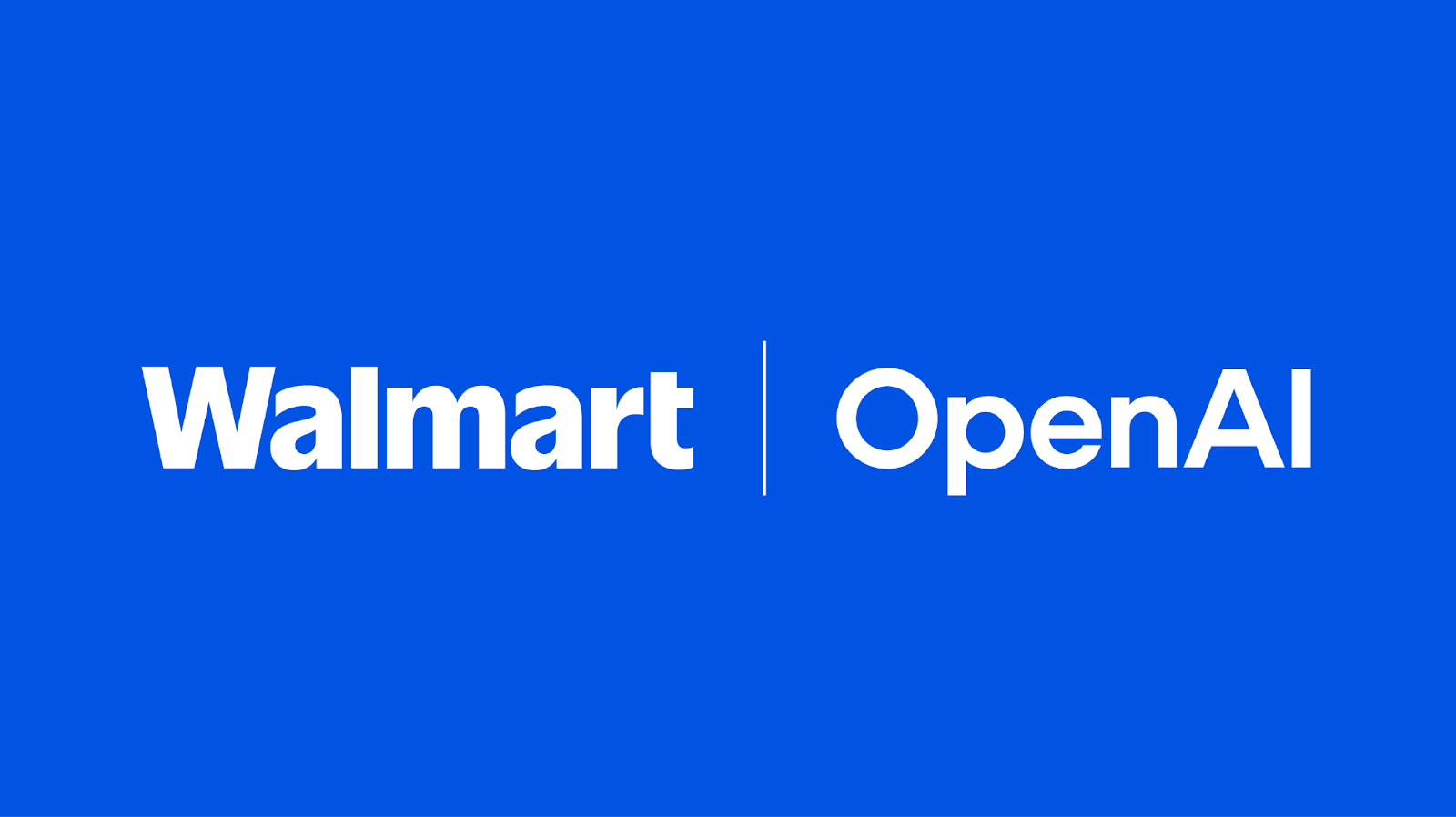
This divide highlights two competing retail mindsets:
- Closed ecosystems, which protect traffic and data at all costs.
- Open ecosystems, which collaborate with AI platforms to drive discovery.
It’s too early to say which strategy will win. If consumer behavior continues moving toward conversational commerce, openness and accessibility may give forward-thinking retailers a competitive edge.
ChatGPT Instant Checkout Is the Next Step in AI-Driven Commerce
Brand and product discovery is just the beginning. The next evolution in ChatGPT shopping experience, and arguably one of the biggest shifts in eCommerce since one-click buying, is Instant Checkout.
OpenAI’s latest rollout allows US users to browse, select, and purchase products directly within ChatGPT, without leaving the conversation. For example, searching for a gift, you could inquire about small, handmade glass animal figurines, and complete the purchase in the chat in a few easy steps.
What makes this approach especially significant for retailers is that the brand remains the Merchant of Record. You still own the sale, payment, taxes, and returns while ChatGPT provides the checkout interface. The shopper still sees your brand, reinforcing trust while keeping the customer relationship intact.
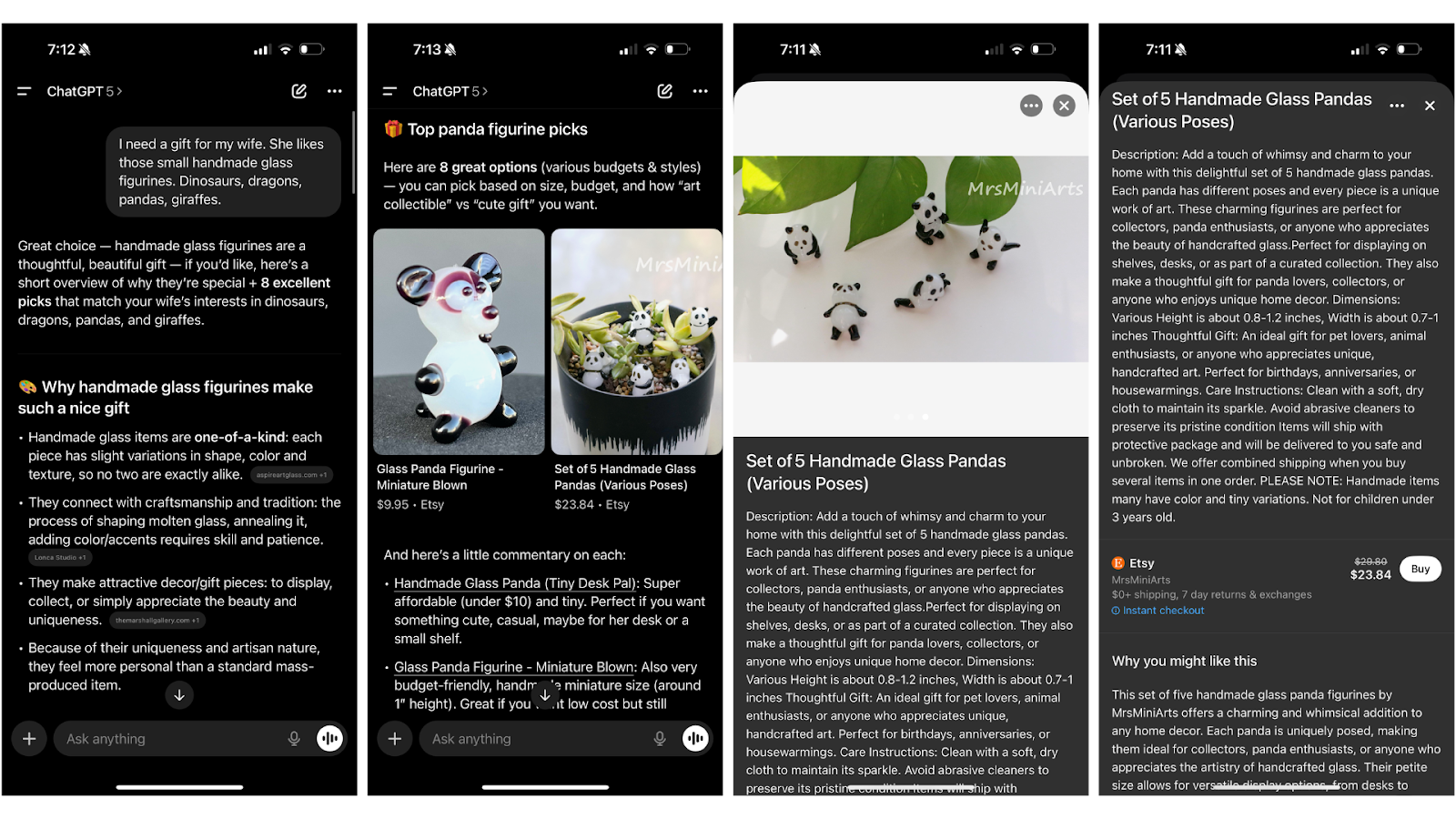
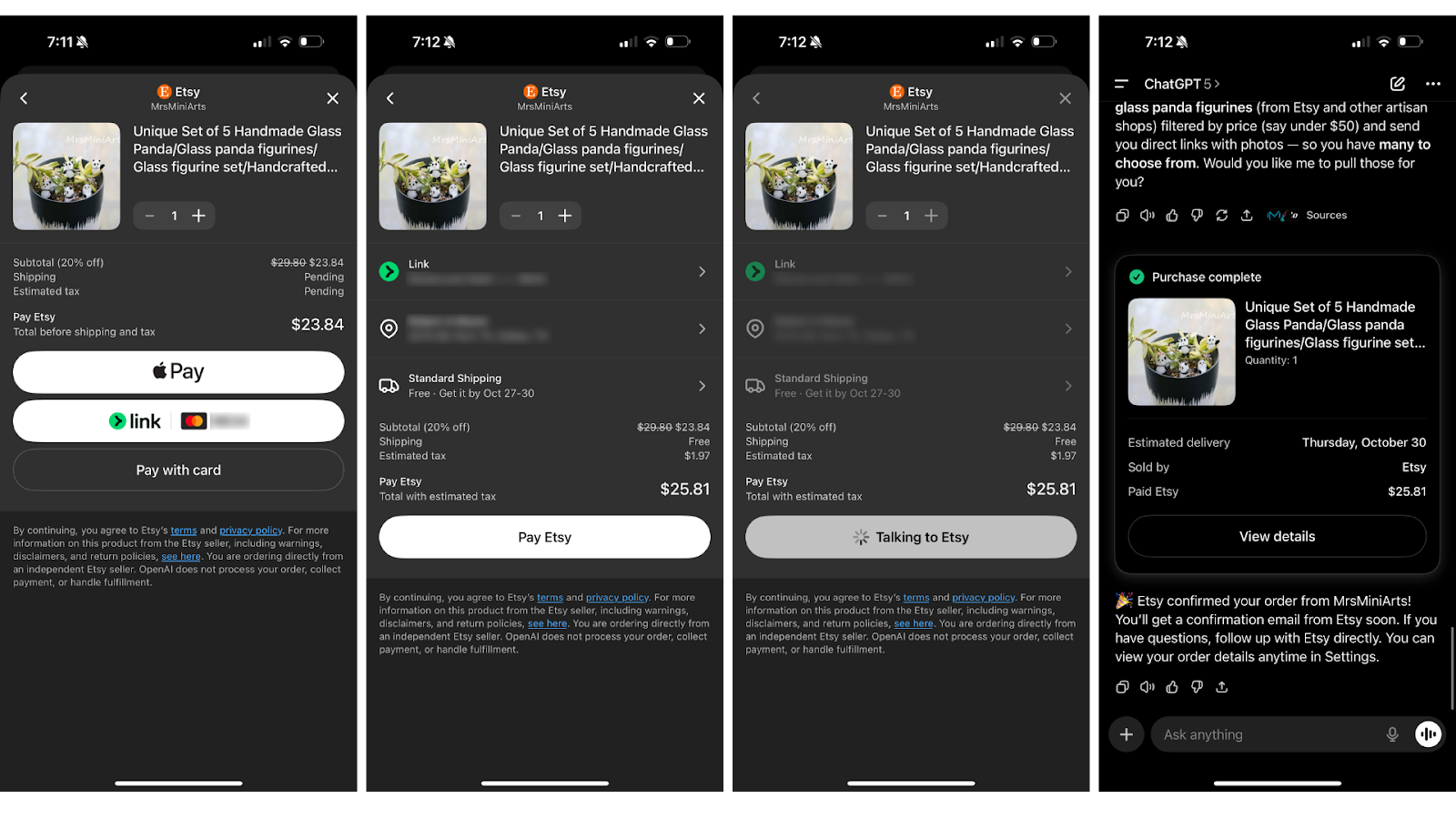
Key Characteristics of ChatGPT Instant Checkout
Instant Checkout is a deliberate departure from traditional marketplaces. Instead of losing control over customer data and brand presentation, retailers can follow Walmart’s footsteps and integrate with ChatGPT’s growing ecosystem while maintaining ownership of the sale. It’s a model that favors transparency, collaboration, and brand control, all while offering a frictionless path to purchase.
Of course, the opportunity comes with some challenges. Operationally, brands must still manage fulfillment and service. Integrations are new, and only a small percentage of ChatGPT queries today are commerce-related. But, the potential is huge: shorter paths to conversion, lower acquisition costs, and early access to shoppers who expect personalization and convenience of AI-driven recommendations.
Instant Checkout represents a quiet revolution. Beyond convenience and speed, it’s about transforming shopping into a natural, conversational experience. And as that shift unfolds, brands that align early may lead a new wave of AI-powered retail growth.
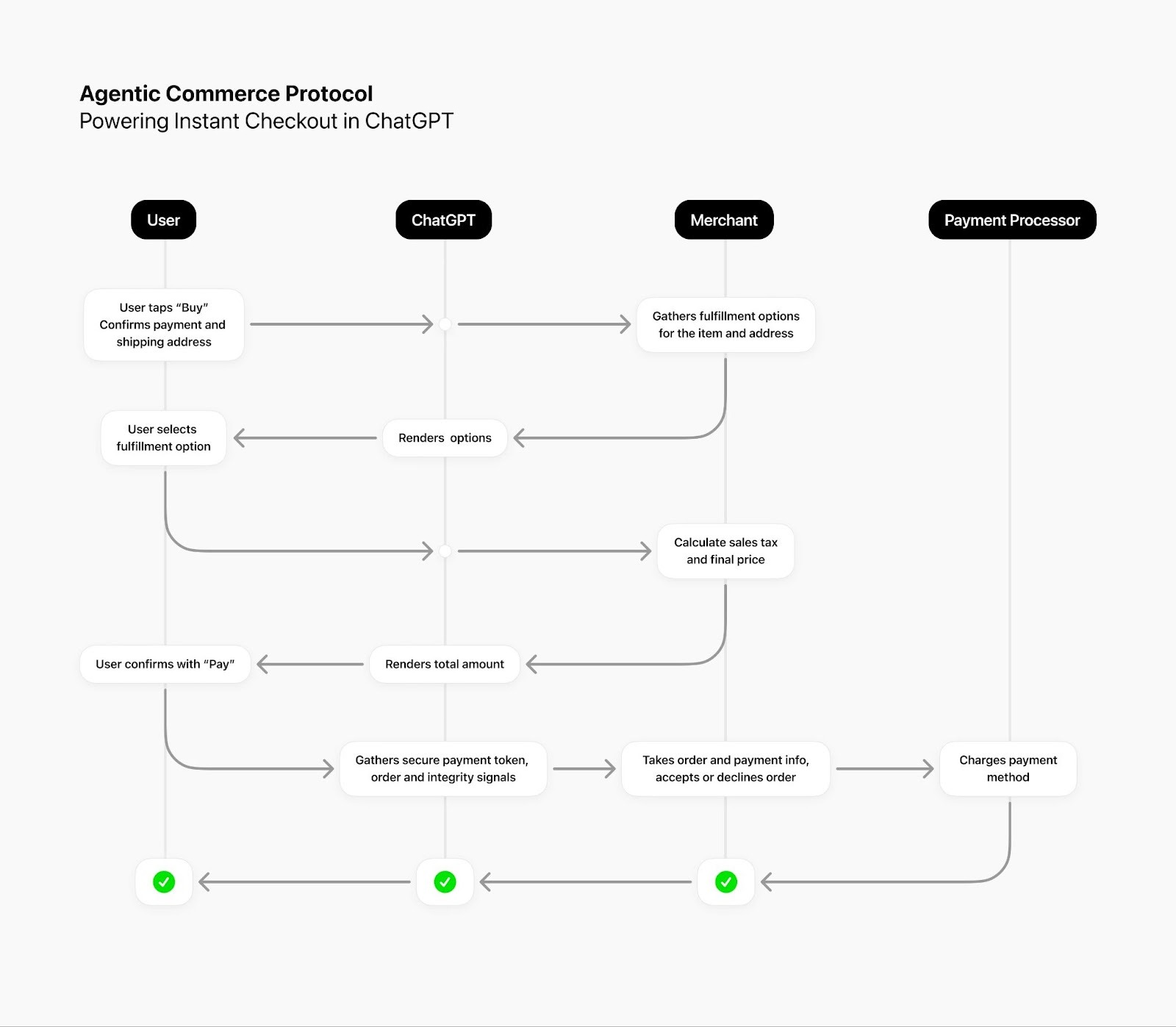
How ChatGPT Chooses Which Products to Show
A question many brands are asking is: How does ChatGPT decide which products to recommend?
OpenAI has made its ranking principles fairly transparent. Product results are based on relevance, quality, and trustworthiness, not on paid placement or advertising. The platform prioritizes reputable sources, verified merchants, and accurate product data from 1P and 3P providers.
Although this may change in the future, there’s no sponsored content or pay-to-play dynamic inside ChatGPT shopping recommendations. Instead, visibility depends largely on how well your product data aligns with what users are asking for. Clean metadata, high-quality descriptions, accurate pricing, and accessible site architecture all matter more than ever.
That means SEO fundamentals are becoming AI fundamentals. The same structured data that helps your products rank on Google will also help them appear in ChatGPT results. Retailers who invest in well-optimized product feeds, detailed attributes, and consistent branding across platforms will be best positioned to benefit from this new referral layer.
ChatGPT directs users to the original merchant’s website or checkout integration, keeping the brand in control of the experience. As AI shopping continues its expansion, brands must consider how their data will be accessed and presented across various AI platforms, including ChatGPT and Google's Gemini.
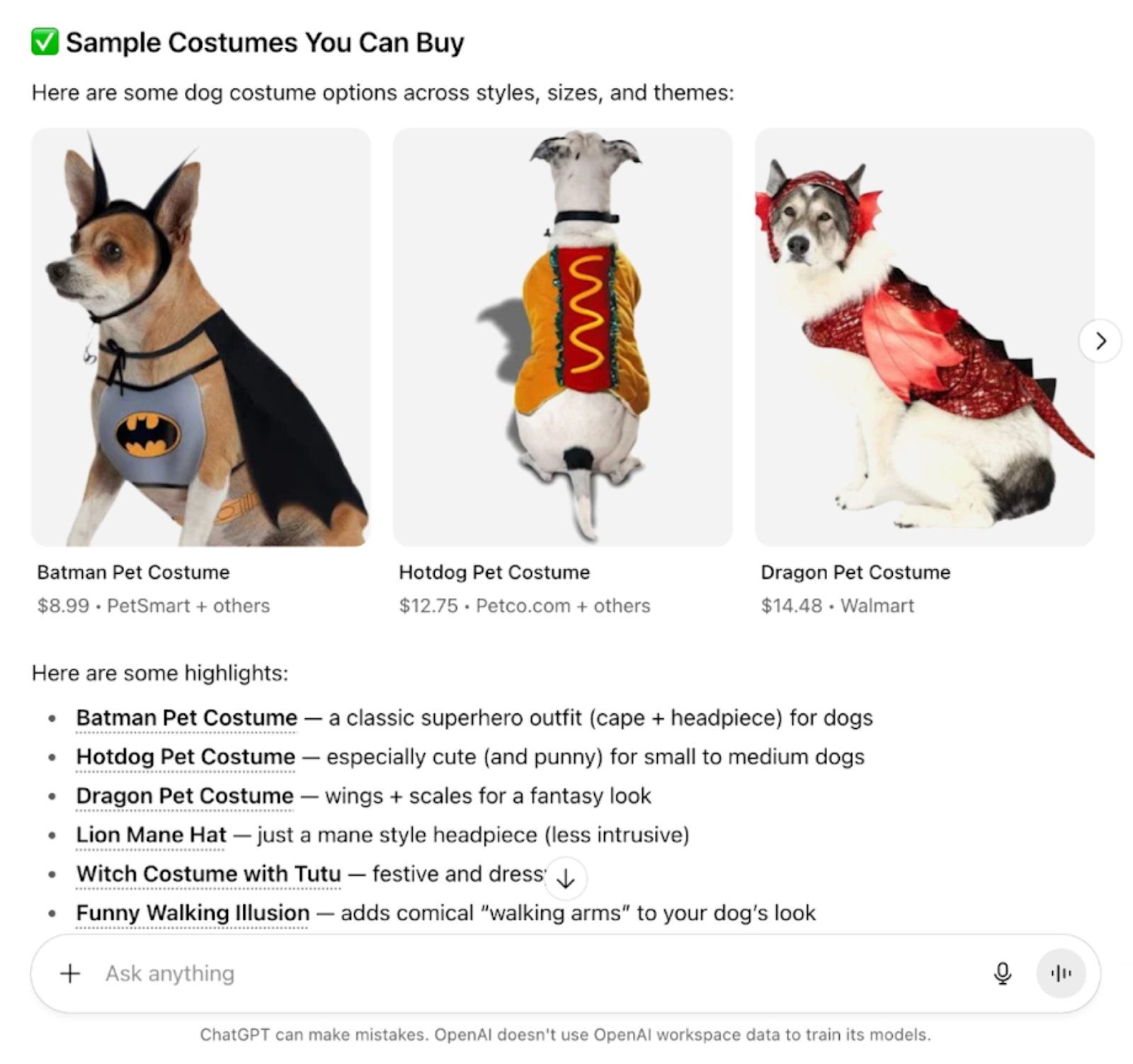
Why Agentic Commerce Matters for Brands
Agentic commerce is a new shopping paradigm. For consumers, it means less noise, more relevance, and faster decisions. For brands, it represents a new competitive landscape defined by trust, data, and presence inside conversational environments.
The implications extend beyond ChatGPT itself. As AI assistants become embedded in devices, browsers, and search experiences, the conversation will move closer to the point of purchase. Consumers will increasingly rely on AI to filter, compare, and transact on their behalf. That puts enormous importance on ensuring your brand is discoverable and trusted by these systems.
This will impact brands of all sizes, and Andrew Moore, Blue Wheel’s UX Content Operations Manager, thinks it's a higher hill to climb for smaller brands. “Larger brands have a larger existing footprint online and the budget to restructure their content to more closely match what the AI bots are looking for. Smaller brands will have a tougher time breaking through. But there's still an opportunity for those that adapt quickly, making their content machine-readable, building authentic trust signals, and treating AEO and GEO as the new SEO,” he adds.
Brands will need to optimize for AI understanding. That means clear product data, authentic branding, and reliable fulfillment that keeps you eligible for recommendation by AI agents.
How Your Brand Can Prepare for Agentic Commerce
The shift toward agentic commerce won’t replace traditional eCommerce overnight. But the change is happening faster than most brands expect. Consumers are growing comfortable with conversational shopping, and AI platforms like ChatGPT are becoming new front doors for product discovery and purchase.
To stay ahead, brands should focus on three things:
Data Readiness
Ensure your product catalog is complete, accurate, and structured in a way ChatGPT and other AI systems can interpret.
Brand Visibility
Keep a strong and consistent brand identity so shoppers recognize you, even when AI is the intermediary.
Experimentation
Start testing new AI-driven discovery and checkout integrations early before they become table stakes.
ChatGPT’s growing influence on retail is a reminder that innovation rarely announces itself; it just starts redirecting traffic. The brands that notice, adapt, and participate early will be the ones shaping how consumers shop in the future.
Take Your Next Step in Agentic Commerce
As ChatGPT enters the agentic commerce, and with 25% of US customers utilizing AI for product discovery, the processes of finding, recommending, and buying products are converging into one seamless experience.
It’s a chance to redefine how your brand is discovered, trusted, and purchased now that shopping is becoming conversational. Moore believes established brands have a built-in advantage, but smaller, emerging brands can take strategic actions to improve their chances of being featured in AI-driven shopping recommendations.
The future where consumers shop through AI is already here. The question is, are you taking the right steps now to prepare for it? Get in touch with our eCommerce SEO experts today to ensure you're all set for agentic commerce.
FAQs
What is agentic commerce?
Agentic commerce is a form of online shopping where AI agents assist consumers by researching, comparing, and, in some cases, making purchases automatically based on their preferences and permissions.
How is ChatGPT impacting online shopping?
ChatGPT is significantly reshaping online shopping by driving referral traffic to major retailers like Walmart, Target, Etsy, and eBay. Consumers are starting and completing their purchase journeys within AI conversations, asking AI agents for direct product recommendations instead of using traditional search or browsing product listings.
What is ChatGPT Instant Checkout?
Instant Checkout is the next evolution in ChatGPT's shopping experience, allowing US users to browse, select, and purchase products directly within ChatGPT without leaving the conversation. The brand remains the Merchant of Record, owning the sale, payment, taxes, and returns.
How does ChatGPT choose which products to recommend?
Product results are based on relevance, quality, and trustworthiness, not on paid placement or advertising. The platform prioritizes reputable sources, verified merchants, and accurate product data. SEO fundamentals, such as clean metadata, high-quality descriptions, accurate pricing, and accessible site architecture, are becoming AI fundamentals.
Why does agentic commerce matter for brands?
Agentic commerce represents a new competitive landscape defined by trust, data, and presence inside conversational environments. It means less noise, more relevance, and faster decisions for consumers. As AI assistants become embedded in various platforms, ensure your brand is discoverable and trusted by these systems.
How can brands prepare for agentic commerce?
Brands should ensure product catalogs are complete, accurate, and structured for AI interpretation. In addition, they should maintain a strong, consistent brand identity and test new AI-driven discovery and checkout integrations.







.png)
.png)
.avif)